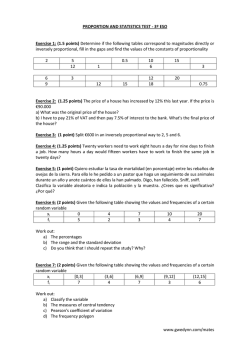
Sor Juana Inés de la Cruz (Mexico, 1648
Sor Juana Inés de la Cruz (Mexico, 1648-1695) Juana Ramírez y Azbache was born to an unmarried Mexican-Spanish woman in 1648 and grew up on her maternal grandfather's farm, about a day's ride outside of Mexico City. At an early age she learned to read and soon began writing poetry — unusual accomplishments for a girl of her times. She came to the attention of the viceroy's wife, who took the girl into her viceregal entourage. At the age of 18 she entered a convent, since the university was closed to women and there was no other profession that offered any opportunity for following a career of the mind. As a nun she adopted the name by which she is known, Sor Juana Inés de la Cruz. She was also known to the tiny reading public of colonial Mexico as "the Phoenix of America." Her writings brought her the friendship of the best educated minds of the time, notably that of her contemporary Carlos Sigüenza y Góngora, a scientist and man of letters who himself had entered the Jesuit order so that he could pursue his studies. But her writings also scandalized those who felt women had no place in the public realm. Beginning in 1690, the bishop of Puebla and her own confessor began a campaign to silence her. She wrote a lengthy and reasoned defense of herself and of women in general in 1691, but in 1694 she yielded to the intense pressure to conform, signing in her own blood a confession that renounced her scholarly pretensions. The next year she died at the age of 46 in one of the many epidemics that swept the colonial world. 1 In one of her best-known poems, "Sátira filosófica" (Philosophical Satire), Sor Juana questioned why women should be held guilty for the sins provoked by men. This poem is characteristic of her voice, in that it revels in the clever contrasts, oxymorons, and classical allusions typical of the Baroque literary sensibility of her time, but states them in a clean, clear, streamlined manner that is all her own. It is easy to read this poem today as a proto-feminist statement, but it is worth considering why this has long been one of the most popular poems in supposedly "machista" Latin America. Poema 92. Sátira filosófica [Arguye de inconsecuentes el gusto y la censura de los hombres que en las mujeres acusan lo que causan.] Poem 92. Philosophical Satire Hombres necios que acusáis a la mujer sin razón, sin ver que sois la ocasión de lo mismo que culpáis: [Which contends that the appetites and the criticisms of men are inconsistent when they denounce in women what they themselves cause.] Mulish men, you like to accuse woman without reason — you never see that you're the occasion of what you blame on them: si con ansia sin igual solicitáis su desdén, ¿por qué queréis que obren bien si las incitáis al mal? when you're so over-anxious to solicit their disdain, why expect them to do well while you urge them on to evil? 1 See Juana Inés de la Cruz, The Answer / La Respuesta, critical edition and translation by Electa Arenal and Amanda Powell (New York: The Feminist Press, 1994). Combatís su resistencia y luego, con gravedad, decís que fue livianidad lo que hizo la diligencia. You assail all their resistance and then, in serious tones, you call mere frivolity what your diligence has done. Parecer quiere el denuedo de vuestro parecer loco, al niño que pone el coco y luego le tiene miedo. The boldness of your mad opinion reminds one of a boy who calls up the bogeyman, then cowers in fear of him. Queréis, con presunción necia, hallar a la que buscáis, para pretendida, Thais, y en la posesión, Lucrecia. You hope, with mulish presumption, to see the one you seek as Thaïs when you're courting her, but when you have her, Lucrecia. 2 ¿Que humor puede ser más raro que el que, falto de consejo, él mismo empaña el espejo, y siente que no esté claro? Whose humor could be odder than his who, lacking judgment, fogs up his own mirror, then regrets it isn't clear? Con el favor y el desdén tenéis condición igual, quejándoos, si os tratan mal, burlándoos, si os quieren bien. You have the same condition with both favor and disdain: they treat you ill, then you complain; they love you well, you mock them. Opinión, ninguna gana; pues la que más se recata, si no os admite, es ingrata, y si os admite, es liviana. However discrete a woman is she never wins your esteem. If she doesn't let you in, she's mean; she let you in, she's easy. Siempre tan necios andáis que, con desigual nivel, a una culpáis por cruel y a otra por fácil culpáis. You're so stubborn in your mulishness that, on your faulty scale, you blame one woman for being cruel and the next one for her looseness. ¿Pues cómo ha de estar templada la que vuestro amor pretende, si la que es ingrata, ofende, y la que es fácil, enfada? How could the one you woo in love maintain her temperance, when her meanness offends you and her looseness enrages? Mas, entre el enfado y pena que vuestro gusto refiere, bien haya la que no os quiere y quejaos en hora buena. Yet between the anger and the grief that your appetites recount, blessed be the woman who doesn't love you, and go complain for all you're worth. 2 Thais was the concubine of Alexander the Great and of Ptolomey and became the classical symbol of the libertine woman. Lucrecia, a woman in Roman legend who was betrayed and raped and who committed suicide to prevent her husband's dishonor, represented the type of the virtuous woman. Dan vuestras amantes penas a sus libertades alas, y después de hacerlas malas las queréis hallar muy buenas. Your lover's grief gives wings to their liberties, yet after making them so bad you expect them to be very good. ¿Cuál mayor culpa ha tenido en una pasión errada: la que cae de rogada, o el que ruega de caído? Whose blame should be the greater in an ill-starred passion: she who, begged-for, falls, or he who, fallen, begs her? ¿O cuál es más de culpar, aunque cualquiera mal haga: la que peca por la paga, o el que paga por pecar? Or who deserves more blame, though both of them do ill: she who sins for pay, or he who pays for sin? Pues ¿para qué os espantáis de la culpa que tenéis? Queredlas cual las hacéis o hacedlas cual las buscáis. So why are you so afraid of blame, if it's your own? Love them as you've made them, or make them as you'd have them be. Dejad de solicitar, y después, con más razón, acusaréis la afición de la que os fuere a rogar. Just stop all your soliciting and then, with more the reason, you may denounce the infatuation of the woman who begs for you. Bien con muchas armas fundo que lidia vuestra arrogancia, pues en promesa e instancia juntáis diablo, carne y mundo. With these weapons I have proved that all you wield is arrogance, for in your promises and demands you unite devil, flesh, and world.
© Copyright 2026


